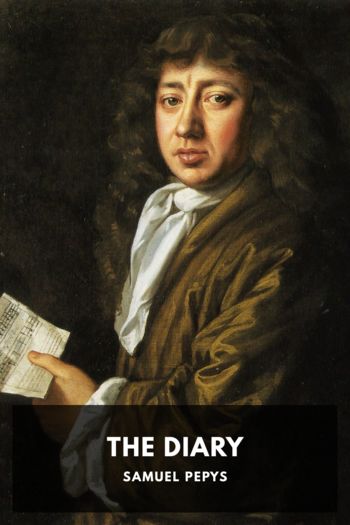The Diary, Samuel Pepys [e reader books TXT] 📗

- Author: Samuel Pepys
Book online «The Diary, Samuel Pepys [e reader books TXT] 📗». Author Samuel Pepys
This Mr. Windham had entered into a formal engagement with the Earl of Rochester, “not without ceremonies of religion, that if either of them died, he should appear, and give the other notice of the future state, if there was any.” He was probably one of the brothers of Sir William Wyndham, Bart. See Wordsworth’s Ecclesiastical Biography, fourth edition, vol. iv, p. 615. —B. ↩
It is not clear whether the Mr. Fenn mentioned several times about this period was Pepys’s old friend Jack Fenn, or Nicholas Fenn who was at a later date Commissioner of the Victualling Office. ↩
Eastland was a name given to the eastern countries of Europe. The Eastland Company, or Company of Merchants trading to the East Country, was incorporated in Queen Elizabeth’s reign (anno 21), and the charter was confirmed 13 Car. II. They were also called “The Merchants of Elbing.” ↩
Alexander Burnett, M.D. (Camb., 1648), admitted an Honorary Fellow of the College of Physicians in December, 1664. His house was in Fenchurch Street. He was reported to have fallen a victim to his zeal.
“Dr. Burnett, Dr. Glover, and one or two more of the College of Physicians, with Dr. O’Dowd, which was licensed by my Lord’s Grace of Canterbury, some surgeons, apothecaries, and Johnson, the chemist, died all very suddenly. Some say (but God forbid that I should report it for truth) that these, in a consultation together, if not all, yet the greatest part of them, attempted to open a dead corpse which was full of the tokens; and being in hand with the dissected body, some fell down dead immediately, and others did not outlive the next day at noon.”
Tillison to Dr. Sancroft, September 14th, 1665, in Ellis’s Original Letters, second series, vol. iv, p. 37↩
Mrs. Williams, Lord Brounckers mistress, frequently mentioned in the Diary after this date. ↩
For note on the copy of Charles I’s Works, now in the Pepysian Library, see note 1444. ↩
Theophilus Biddulph, of Westcombe, co. Kent, was created a baronet in October, 1664. ↩
Seventh son of Thomas Howard, first Earl of Berkshire; he was the direct ancestor of the present Earl of Suffolk, to whom both the titles descended. —B. ↩
This republican plot was described by the Lord Chancellor in a speech delivered on October 9th, when parliament met at Oxford. ↩
Alexander Browne, the limner, who taught Mrs. Pepys drawing. ↩
See note 1345. ↩
Alderman Sir William Hooker was Sheriff in 1665 and Lord Mayor in 1673. He contracted to supply tallow to the Navy Commissioners. ↩
See, on Colonel Blunt’s carriage, note 2490. ↩
Shooter’s Hill, Blackheath. ↩
Swakeley House, in the parish of Ickenham, Middlesex, was built in 1638 by Sir Edmund Wright (Lord Mayor 1641), whose daughter married Sir James Harrington, one of Charles I’s judges. The property was sold in 1665 by Lady Harrington to Sir Robert Vyner (Lord Mayor 1674). Benjamin Lethieullier bought the manor in 1741 from the Vyner family and sold it to Thomas Clarke in 1750. The manor belonged to Robert Swaklyve in the early part of the fourteenth century. ↩
Mary, daughter of John Whitchurch, Esq., and widow of Sir Thomas Hyde, Bart., of Albury, Herts. ↩
Dawley House, long the seat of the Bennet family. ↩
Harlington is a village in Middlesex, about a mile from Uxbridge. The manor was sold by Francis Coppinger in 1607 to Sir John Bennet, whose son, Sir Henry Bennet, took his title from the place under the cocknified form of Arlington. It was alienated by Ford Grey, Earl of Tankerville, to Viscount Bolingbroke. ↩
Sir William Doyly, of Shottisham, Norfolk, knighted 1642, created a baronet 1663. M.P. for Yarmouth. Died 1677. He and Mr. Evelyn were at this time appointed commissioners for the care of the sick and wounded seamen and prisoners of war. —B. ↩
Ombre is a Spanish game of cards, and the name is derived from the Spanish word hombre, a man. It is said that the game was introduced into England by Queen Katharine of Braganza. Waller wrote an epigram “On a card that her Majesty tore at Ombre.” Mr. H. Hucks Gibbs published anonymously in 1873 an interesting little volume, with coloured plates, entitled The Game of Ombre. ↩
The practice of having a down coverlet like a bed is not confined to Denmark, as all travellers in Germany and Switzerland know. ↩
See note 2633 respecting these prizes. ↩
“The Hector is lost, with most of her crew, and her captain, a gallant man, who had brought in the Vice-Admiral of the East India fleet. Captains Lambert and Langhorne have also fallen.”
Calendar of State Papers, 1664–65, p. 562↩
A gold coin, so called because it bore the image of an angel, varying in value from six shillings and eightpence to ten shillings. ↩
Sir William Hickes, created a baronet 1619. Died 1680, aged eighty-four. His country seat was called Ruckholts, or Rookwood, at Layton, in Essex, where he entertained King Charles II after hunting. —B. ↩
The old name for backgammon, used by Shakespeare and others. The following lines are from an epitaph entirely made up of puns on backgammon
“Man’s life’s a





Comments (0)